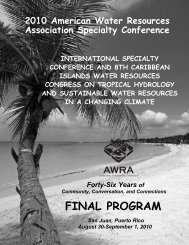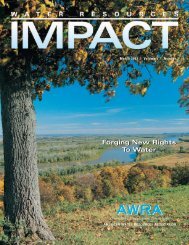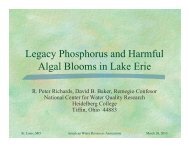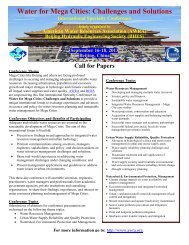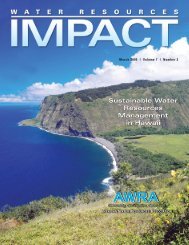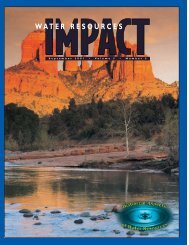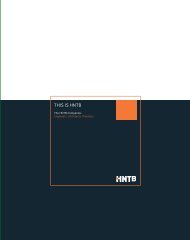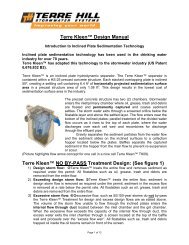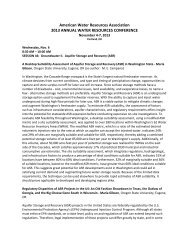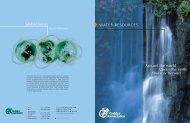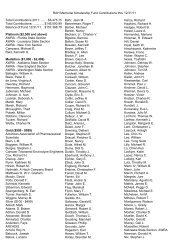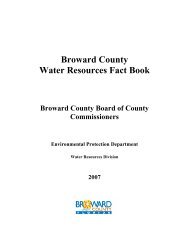N ovember 2 0 0 0 ⢠V olume 2 ⢠N umber 6 - American Water ...
N ovember 2 0 0 0 ⢠V olume 2 ⢠N umber 6 - American Water ...
N ovember 2 0 0 0 ⢠V olume 2 ⢠N umber 6 - American Water ...
Create successful ePaper yourself
Turn your PDF publications into a flip-book with our unique Google optimized e-Paper software.
TMDL: EPA Muddies the Nation’s <strong>Water</strong>s . . . cont’d.<br />
In addition to the reams of paperwork EPA is requiring<br />
the states to produce, the agency originally wanted to<br />
designate certain silvicultural (tree farming), animal feeding,<br />
and aquatic operations as point sources of water pollution.<br />
This would have required owners of these businesses<br />
to seek permits directly from EPA to carry out<br />
their daily operations, a procedure entailing unacceptable<br />
delays in dealing with such problems as infestation,<br />
droughts, or floods. Under fierce pressure from Congress,<br />
and in the hope of fragmenting opposition to its rule, EPA<br />
scuttled its plans to treat farmers and growers as point<br />
sources. However, these people are by no means off the<br />
hook; their operations are, even as nonpoint sources, still<br />
included in the TMDL requirements EPA is imposing on<br />
the states. As such, they still could face direct control by<br />
EPA if the agency is not satisfied with the performance of<br />
the states.<br />
Responding to a barrage of criticism from Congress,<br />
governors, state environmental officials, as well as business<br />
and agricultural groups, EPA, in the weeks and days<br />
preceding promulgation of the rule, frantically rewrote<br />
whole sections of its proposal. It did so, however, without<br />
allowing an opportunity for public comment on the<br />
changes it had made. In a May 31, 2000, report, the Congressional<br />
Research Service concluded that EPA had<br />
done little to respond to the concerns raised by stakeholders.<br />
Exasperated, the Association of State and Interstate<br />
<strong>Water</strong> Pollution Control Administrators concluded<br />
in a June 29, 2000, letter to EPA Administrator Carol<br />
Browner “that this set of rules is technically, scientifically,<br />
and fiscally unworkable.”<br />
The chaotic circumstances under which EPA pushed<br />
through the rule were captured in a statement issued by<br />
Rep. Sherwood Boehlert, chairman of the House Subcommittee<br />
on Transportation and Infrastructure. “On<br />
May 24, 2000, I asked Administrator Browner to withdraw<br />
EPA’s TMDL proposal because of the overwhelming<br />
opposition to these proposals by stakeholders on all sides<br />
of the issue and because EPA could not explain how the<br />
proposed changes would be implemented,” Boehlert said.<br />
“Unfortunately, Administrator Browner has not responded.<br />
Instead, over the past month, senior EPA officials<br />
have been calling members of Congress, calling interest<br />
groups, making conflicting promises, and negotiating<br />
changes with select stakeholders in a last-ditch effort to<br />
drum up support for these flawed proposals. This is not<br />
the type of open, public process, one should be able to expect<br />
when important federal regulations are under development.”<br />
Convinced EPA’s rule would wreak havoc in communities<br />
throughout the country, Congress, with wide bipartisan<br />
support, attached riders to appropriations bills<br />
barring EPA from spending any money on implementing<br />
its TMDL rule in FY 2000 and FY 2001. However, Administrator<br />
Browner signed the new rule into law one day before<br />
President Clinton put his signature on the appropriations<br />
measures.<br />
“EPA is taking this action in the face of overwhelming<br />
opposition from the National Governors’ Association,<br />
small businesses, farmers, and other landowners across<br />
America, and in direct defiance of a directive by Congress<br />
to forego finalizing or implementing these new rules this<br />
year or next,” commented Rep. Bud Shuster (R-Pennsylvania<br />
and chairman of the House Committee on Transportation<br />
and Infrastructure).<br />
“All of this is nothing but a political power grab by the<br />
people running the EPA,” complained Rep. Marion Berry<br />
(D-Arkansas). “They have no scientific reason for doing<br />
any of these things.”<br />
By rushing the TMDL rule into law before crucial<br />
questions about its content and implications could be answered,<br />
EPA opened the door to litigation that will last for<br />
years. The resulting uncertainty means that state officials<br />
and the regulated community will not know what<br />
steps they must take until the courts, a new Congress, or<br />
a new administration can resolve the issue.<br />
AUTHOR LINK<br />
E-MAIL<br />
Bonner R. Cohen, Ph.D.<br />
Senior Fellow<br />
1655 North Fort Myer Drive<br />
Suite 325<br />
Arlington, VA 22209<br />
(703) 522-5828 / Fax: (703) 522-5837<br />
cohen@lexingtoninstitute.org<br />
Bonner R. Cohen is a senior fellow at the Lexington Institute<br />
in Arlington, Virginia. He joined the Lexington Institute<br />
as a senior fellow in January 1999. Dr. Cohen has<br />
lectured and participated in panels dealing with environmental<br />
issues in the U.S. and abroad and is a frequent<br />
commentator on television and radio programs. He was<br />
editor of EPA Watch from 1992 to 1999 and currently<br />
serves as Washington editor for Environment & Climate<br />
News and is the Washington correspondent for the Earth<br />
Times. Together with Steve Milloy, he served as editor of<br />
<strong>American</strong> Values: An Environmental Vision, an anthology<br />
published by the Environmental Policy Analysis Network<br />
in 1996. Articles by Dr. Cohen have appeared in<br />
Forbes, The Weekly Standard, National Review, Investor's<br />
Business Daily, Journal of Commerce, Washington<br />
Times, and other publications. He has been interviewed<br />
on CNN, America's Voice, and numerous radio programs.<br />
His previous positions include that of research associate<br />
at the Stiftung Wissenschaft und Politik (Foundation for<br />
Science and Policy) in Ebenhausen, Germany and as a<br />
German-language lecturer for the United States Information<br />
Agency (USIA) in Germany. Dr. Cohen holds a Ph. D.<br />
(summa cum laude) from the University of Munich and a<br />
B.A. from the University of Georgia.<br />
❖ ❖ ❖<br />
10 • <strong>Water</strong> Resources IMPACT N<strong>ovember</strong> • 2000



